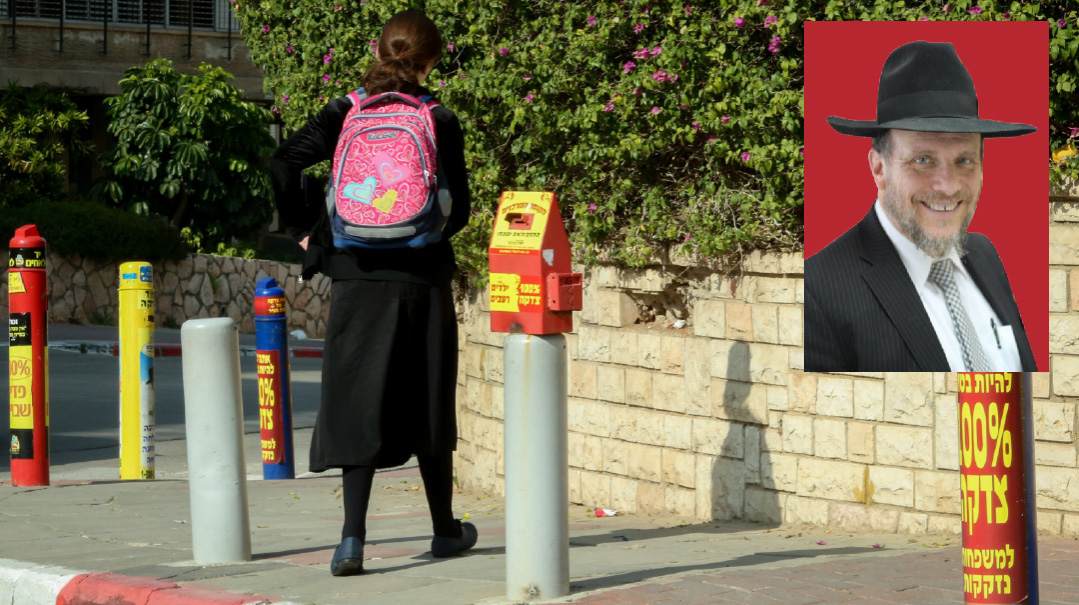What to Tell the Shadchan When My Daughter Wants a Working Boy?

Your daughter wants to fit in; she also wants the comforts of a husband who will support her

Q
My daughter is 20 and in shidduchim — please daven for us! She really wants a fine boy who is a yerei Shamayim and prioritizes learning; but more than anything, she wants to be the kind of mother who stays home with her children until they’re old enough to go to school.
To me, that means working boy — if she’s at home, and he’s in kollel, who is paying the rent and heat and electric? But when I discuss it with close friends and family, I am being strongly advised to say that she’s looking for a “short-term learner,” because the boys in shidduchim who are working won’t be good matches for her.
That feels to me like lying, and my daughter’s not comfortable misrepresenting herself either. What should we do?
A
In all honesty, I was worried that this question would present itself. I was hoping to avoid addressing it, but I am hearing it with such frequency and urgency that I have no choice but to enter the lion’s den.
There are few elements involved in answering your query, and we will try to cover them all. Let’s dissect your question.
- She really wants “A, B, and C”— a fine boy, who is a yerei Shamayim, and who prioritizes learning— three very worthy attributes.
- “But,” you continue, “more than anything, she wants to be the kind of mother who is home with her children.” This adds a fourth factor, “D,” to the equation.
- Now we have a conflict. Item D, her husband having a fully supporting parnassah, trumps all three items, A, B, and C, in statement 1.
- Friends and family are advising you to play around with words, because this is just a game.
- But you feel like that would be lying, and your daughter is not comfortable saying that her husband having that kind of parnassah is not the most important thing to her, when really it is.
We are dealing with confusion, delusion, and collusion.
Thirty years ago, a group of mechanchim approached Rav Shach ztz”l for advice about their talmidim who would not be sitting and learning for the long term. Specifically, they asked him about a new program of studies being offered in a frum environment that would allow students to obtain credentials for parnassah on a shorter track than what was available to the general public. The program would not be held in a yeshivah, nor would it be offered to boys who were still in yeshivah. The question was: Can we allow this program to make inroads with those of our talmidim who fit this description? Or should we tell the program organizers to leave bnei Torah out of this plan?
Rav Shach replied with a story. He recounted that when the Ponevezher Rav wanted to open a kollel, it triggered a serious discussion among the leaders of the yeshivah. Rav Shmuel Rozovsky, the legendary rosh yeshivah, said the kollel should only be open to brilliant young men who could develop into real future leaders. The Ponevezher Rav, on the other hand, held that after the devastation of Churban Europa, during which an entire generation of roshei yeshivah and rabbanim were wiped out, Torah had to be rebuilt, and therefore, the Ponevezh kollel should be open to all talmidim.
The gedolei Yisrael sided with the Ponevezher Rav. People would have to learn again what was already understood in prewar Europe — that Torah is absolutely primary in our lives, and we cannot sustain our Yiddishkeit without it.
Rav Shach told the group that of course there had always been men in yeshivah who went out to work. How many people could sit and learn for extended periods of time under such constraints on parnassah? But everyone who was connected to the yeshivah world knew and understood that Torah is the primary force in our life. He went out to work from a world in which Hashem and Torah were connected in the deepest way. If he knew how to say Tehillim, he did that with his entire heart. If he knew Mishnayos, he would sit and review them in the shul, shtibel, or beis medrash after work. If he learned masechtos, he knew them by heart.
“It is perfectly normal for people to leave yeshivah or kollel to go to work,” said Rav Shach, “but first we need every boy and girl to know that life without Torah learning is not real life.”
He concluded by saying that the time is drawing near when we will have achieved this, and he gave us parameters on who should be able to join these programs when that time comes.
We are now raising the second and third generations of bnei Torah, baruch Hashem. There is tremendous peer pressure on a girl to marry a learning boy. Indeed, it is almost expected that a girl will want a boy who is learning.
Anything I say now will get some people upset, but I will try to speak honestly and frankly. There are two kinds of boys and girls that can sustain a life of Torah learning without the boy working:
- those who are infused with a love and dedication for learning; and
- those whose families are blessed with the resources to commit to supporting that lifestyle.
Yes, I called it a lifestyle, because for many, it has become just that.
Those in the first group are more likely to commit to long-term learning than those in the second group, their “supported” counterparts. One of the rebbeim in the Mirrer yeshivah followed this trend for 30 years. He unequivocally established that having a committed wife is a much greater determinant for the length of time a boy will learn than having a shver with deep pockets. This is because limud Torah is not a “lifestyle”; it is a commitment of love and dedication, surrender and value. When a lifestyle gets uncomfortable, we tend to make changes. When a commitment gets challenging, we work harder to refresh, renew, and get chizuk.
Rav Meir Simcha of Dvinsk, in his Torah classic Meshech Chochmah, gave a clear presentation of the cycle of Jewish history — its extreme lows and tremendous highs. The great sage identified three stages in the cycle: rejuvenation, assimilation, and destruction. In the first stage, a strong, vibrant community blossoms as a generation of rejuvenation for a century or so. That is followed by the second stage, a generation of disillusionment whose mitzvah performance becomes rote, in imitation of those in the first stage of the cycle. The third stage sees a generation continuing to deteriorate, sliding into an abyss of assimilation and ultimate destruction. Then the cycle restarts, and a new stage of rejuvenation occurs.
With these words, written in 1900, Meshech Chochmah predicted with horrifying accuracy what was to transpire only four decades later. He seemed to foresee the imminent Holocaust that would occur as a result of assimilation. We all know that many Jews called Germany the “fatherland”; but Meshech Chochmah also foresaw that the destruction would be followed by a new generation of builders, who would, in time, reanimate Klal Yisrael.
Here we are, a few generations later, facing an alarming rise in anti-Semitism around the world, heralding the next stage. This time, though, we hope that churban will be replaced by Mashiach.
Why am I burdening you with this? Because although the present generation is wonderful, frum, and even yeshivish, there is nevertheless too much mitzvos anashim melumadah. Yiddishkeit by rote, as a “lifestyle.” Yiddishkeit guided by social and peer pressure.
The builders after Churban Europa were my father ztz”l and his peers, roshei yeshivos and balabatim who grew up in America and, together with the extraordinary survivors who came to America, built families, shuls, yeshivos and Bais Yaakovs. My generation is now raising a third and fourth generation that could easily fall to the Meshech Chochmah’s description, chas v’shalom. Easier Yiddishkeit, rote Yiddishkeit, and distracted Yiddishkeit.
We need the next generation of builders, and we are finding them among the multitude of bnei Torah coming out of the yeshivah system, which is growing in leaps and bounds. It is our job as parents and teachers to inspire a generation of people who will make a difference in so many other ways, even if they feel that they are not cut out for the extraordinary zechus of learning Torah day and night.
Your daughter wants to fit in; she also wants the comforts of a husband who will support her. If that is what she wants, then that is what she needs to look for. There are boys who want to work, just like there are girls who want a boy who works.
There is no room for faking it on this issue. If a young man and a young woman are not clear with themselves or with each other about what they want, they will both be miserable. Hopefully, your daughter will find a young man who wants all the good things that she wants — a ben Torah of the sort that Rav Shach was hoping would come about. Dedicated, inspired, and cognizant that Torah learning needs to be the mainstay of his life — which means that he actually learns every day. Someone who will respect talmidei chachamim and those who learn Torah. Someone who has a rebbi he listens to and who follows halachah — but who will be working.
We do not need to be the generation described by the Meshech Chochmah that is more interested in the varieties of sushi and sashimi than in helping our schools become better places, that lives from one vacation to the next instead of making every day count. We can raise enthused Yidden looking to contribute to building the next generation.
Your daughter has to know that she can be a tzadeikes. She needs to believe in her ability to serve Hashem from the place where she is. She does not have to see herself as being “less-than.” She does not have to desire something on a level where she is not holding. If she wants a boy who will be happy for her to be at home with their children, that is a legitimate goal — just as it is legitimate to want to go to work.
She should not compromise, however, in the first three attributes she identified: “a fine boy who is a yerei Shamayim and prioritizes learning.”
It is difficult to find a young man today who is working who has managed to remain refined and a yerei Shamayim. Why is it that a working boy feels like an outsider and therefore is okay with an unfiltered smart phone? Your daughter wants a yerei Shamayim!
So let’s strategize. Let’s talk a little about shadchan language. These days there seem to be only two terms for describing a boy: He’s either a “learning boy,” or a “working boy.” Something is getting lost in these descriptions.
So shadchanim have “refined” the categories a bit, to cover more ground. Now we have gradations to the term “learning boy”:
“one year” — this boy is “yotzei zein,” saying what he “needs” to say
“two to three years” — this boy wants to start off his marriage in learning
“five years” — this boy is serious about learning, and this time frame is really irrelevant; it could continue indefinitely
“wants to start off learning and would love to get into it, but really does not know where it will take him, or if he will be able to sustain it financially” — this is a new category, and there are many girls who feel the same way; they want something more, but they don’t know what it means yet
“working boy” — if you say those words, there are no categories; you will be redt anyone who is working
So in outlining these strategies, am I saying that your cousins are right? No!
You need to add some details to your questions regarding the things that are important to you and your daughter. What type of boy is not defined by two words? You need to add yerei Shamayim! Then you need to ask serious questions: Does he have an unfiltered smartphone? Does he have a rebbi he listens too? Is he very serious about the time he learns, with real commitment?
If those things are not important, then stay with the jargon of shadchanim, because that is a real language understood by most people. However, you must be honest about what she wants.
She may well learn that it is unfortunately unusual to find a working boy who fits the true description of what she wants. If so, then she will need to prioritize and decide what is most important to her. Again, be honest, but ask questions!
In any case, you have our tefillos that she find her proper zivug, quickly and painlessly.
(Originally featured in Mishpacha, Issue 1011)
Oops! We could not locate your form.







